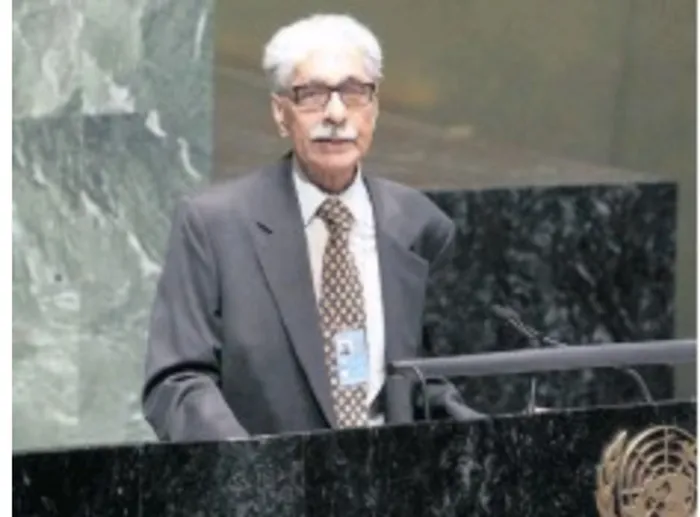Farewell, Enuga Reddy, tireless fighter for justice

ENUGA Sreenivasulu (ES) Reddy. Picture: SA History Online
Durban - ENUGA Sreenivasulu Reddy, who led the UN campaign against apartheid, died in Boston, Massachusetts, in the US on Sunday.
Reddy, who was often referred to as ES, was 96.
He was born in Andhra Pradesh, India, and had followed Mahatma Gandhi and his teachings. Over the years, from his numerous visits, Reddy had developed ties with South Africa.
He studied toward his BA at the University of Madras and in 1943 he obtained a Master’s in political science at New York University. Reddy then undertook his postgraduate studies at Columbia University.
In the late ’40s, Reddy was one of the ANC’s main links in the UN.
Reddy participated in a demonstration in front of the South African Consulate in New York against the suppression of the African mine labour strike and the Pegging Act against the Indian community. He shared a close relationship with Oliver Tambo and Marimuthu Pragalathan Naicker, a political leader, journalist and organiser for the Natal Indian Congress.
Reddy was also one of the founders of the UN’s Special Committee Against Apartheid and the UN Center Against Apartheid. He served as director of the centre until he retired in 1984.
Over the years, he received various recognitions. This included the JoliotCurie Medal from the World Peace Council for his contribution to the Struggle against apartheid; the Padma Shri, which is one of the highest civilian awards of India; and the Companion of OR Tambo, a national award from the South African government.
Mina Reddy, his daughter, who lives in Boston, said: “The family knew him as a tireless advocate for racial justice, a scholar, and a mentor to many. He was so caring and generous that he anticipated the needs and wishes of family and friends and did all he could to satisfy them.”
Professor Jairam Reddy and Reddy were friends for three decades.
“I was the vice-chancellor at the University of Durban-Westville (UDW) when he first visited South Africa,” said Professor Reddy.
“It was in the early 1990s, and he stayed at the campus residence. This period was significant for the country as it saw the release of Nelson Mandela and the unbanning of the ANC and other political parties.
“It also saw the holding of the first ANC conference at UDW and the soonto-begin Codesa negotiations to frame a Constitution for the post-apartheid South Africa’s non-racial democracy. It was during his stay with us that our bond was formed.”
Professor Reddy said he admired that when Reddy visited family or friends, he always took along a memento.
“It was customary to take a bunch of flowers, a box of chocolates, or even a bottle of wine for one’s hosts. Not so with ES. When he visited Fatima Meer or Ela Gandhi or any of the activists, he offered them one of his precious documents that he carried around with him.
“It could be a speech he had made at the UN, a report of a conference or an anti-apartheid resolution passed at the UN that he had accumulated over the years.”
Professor Reddy said one of his fondest memories was when they visited Albert Luthuli’s wife, Nokukhanya Bhengu.
“In keeping with his tradition, ES had brought with him the tape recording of the acceptance speech made by Albert Luthuli when he was awarded the Nobel Peace Prize in Oslo, Norway, in December 1961. We took his tape to the Luthuli home in Groutville, near Stanger. This moment is something I will never forget.”
Professor Reddy said every few years he met Reddy in New York for a meal.
“The last time we met was a year ago when my wife and I visited our daughter in Boston. ES also moved to Boston, and he and his family graciously hosted us to dinner. ES will definitely be remembered for his selfless work.”
Film producer Anant Singh described Reddy’s death as the loss of an unsung hero and a selfless human being.
“I am deeply saddened by the passing of Enuga S Reddy, who was a supporter of our liberation Struggle starting in 1946 when he was part of a group protesting against the racist policies of the Jan Smuts government. I got to know him through Fatima Meer in the late 1980s, and thereafter, I met him in New York on several occasions. We became friends, and he also attended premier’s of my films in New York.”
Singh said when Reddy visited Durban in 2010, to receive the Gandhi Award for Reconciliation and Peace, he was fortunate to spend time with him.
“I was even more fascinated by his deep knowledge of apartheid, the global anti-apartheid movement and Gandhism.”
Singh said a few months ago, they emailed each other and Reddy said that he was writing about apartheid and was watching films on the topic.
Pule Mabe, ANC national spokesperson, said: “Comrade Reddy was one of the ANC’s main links in the United Nations since the late 1940s. He worked hard to draw the international community to the crimes and injustices of apartheid.
“Indeed, South Africa’s liberation from racial oppression is, in part, a product of the work of all freedomloving people across the world. As we mourn his passing, we recall his rallying call before the UN Special Committee Against Apartheid in 1988 where he proclaimed: ‘I cannot feel free, as an Indian, until South Africa is free of apartheid. You can count on me as a volunteer in the international campaign against apartheid until that great day’.”
Mabe said Reddy’s life was dedicated to the fight for justice and freedom.
“We salute his courage and selfless dedication to the freedom of the people of South Africa.”
Reddy leaves his wife, two daughters, four grandsons, three great-grandsons and a large extended family. The cremation will be held in Cambridge, Massachusetts.
Daily News